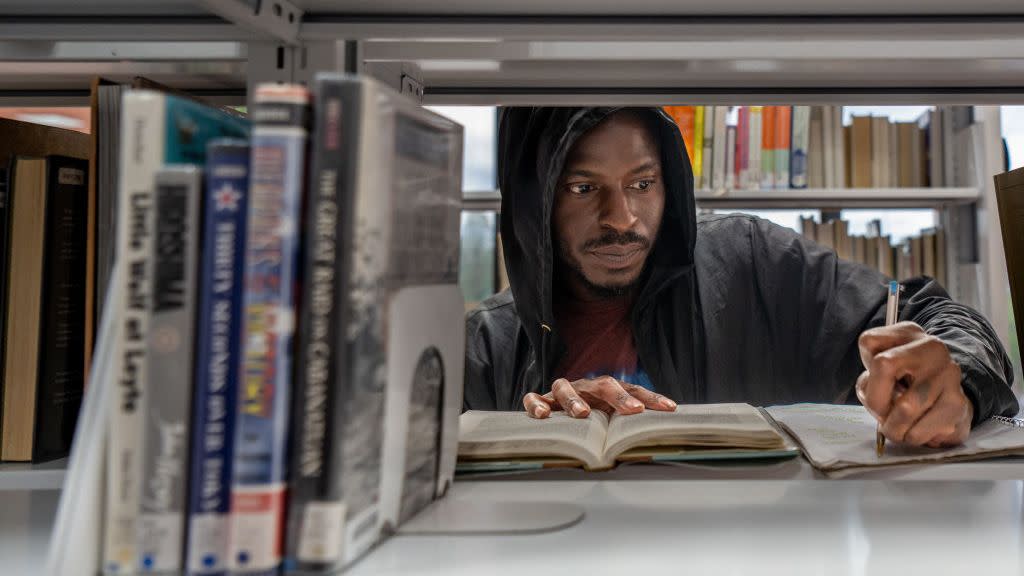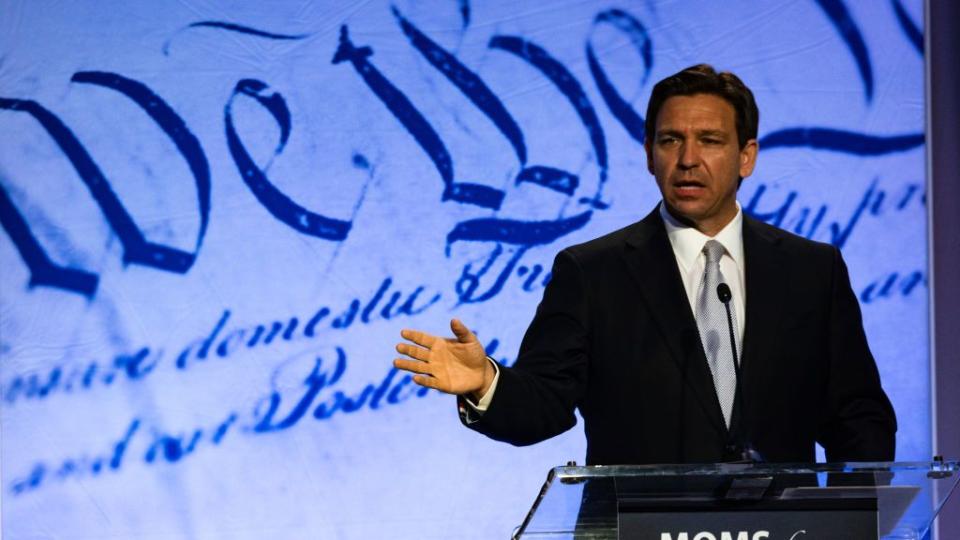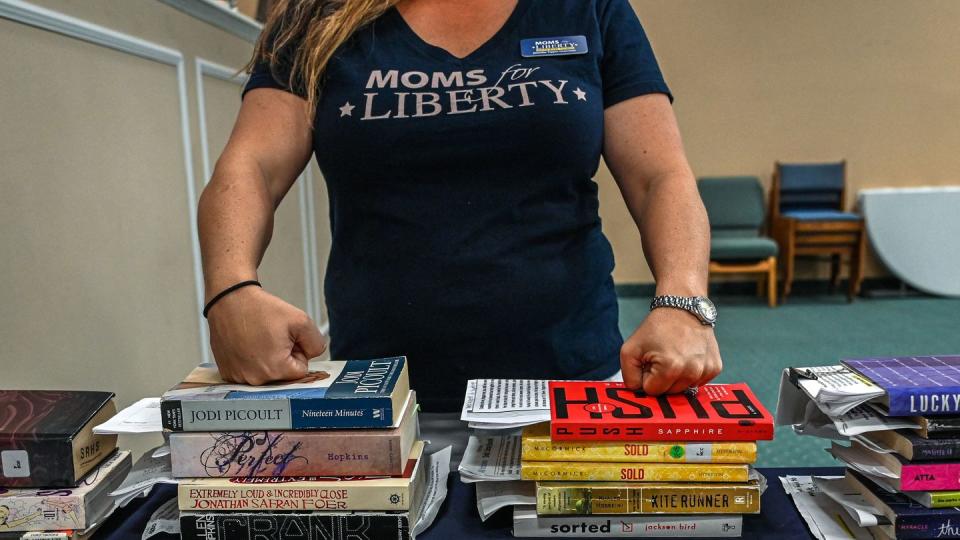Edwidge Danticat on Living and Writing in DeSantis' Florida

- Oops!Something went wrong.Please try again later.
Earlier this year, my 2010 essay collection, Create Dangerously, was adapted for the stage and performed in Miami, where I live. Like the book, the play honors artists, particularly writers who have risked their lives to write their books—as well as the readers who have risked their lives to read them.
It’s a legacy I know well, having grown up first in Haiti, then in the United States among Haitian expatriates. My friend Régine Chassagne, a singer from the indie rock group Arcade Fire, and I recently talked about how during the brutal Duvalier dictatorship in 1963 Haiti, her grand-father, the Haitian poet Roland Chassagne, was arrested at a Port-au-Prince publishing house for sharing “contraband literature.” He was taken to François “Papa Doc” Duvalier’s notorious prison dungeon, Fort Dimanche, and was never heard from again.

Many immigrants in Florida and elsewhere know at least one story like this one. In the past, a Floridian, Texan, or West Virginian might have dismissed such comparisons by saying, “That could never happen here.” Sadly, it is happening and will worsen if we’re not vigilant. Here in Florida, our current governor (and now presidential hopeful), Ron DeSantis, touts our state as “a citadel of freedom.” But in the past two years, DeSantis has signed a six-week abortion ban, a law allowing concealed weapons to be carried without a permit, and the “Don’t Say Gay” bill, which was expanded by the Florida Board of Education to restrict instruction of LGBTQ+ issues in middle and high schools. Transgender youth can no longer start gender-affirming health care, and doctors can refuse to treat transgender people without consequence. The Unauthorized Alien Transport Program, reminiscent of 19th-century fugitive-slave laws, allows state officials to remove and transport migrants from Florida as well as other states. However, by law, those who transport undocumented immigrants into the state, including those in their families and churches, can be considered human smugglers and charged with a third-degree felony. Diversity, equity, and inclusion programs, which might help address historical injustices, have been defunded at public universities; classes, majors, and minors involving race or gender studies are being censored.
"The future seems clear because I’ve seen and read about it before."
DeSantis’s signature “Stop W.O.K.E. Act” has led to the censoring of textbooks, as well as an Advanced Placement African American Studies course, and prohibits teachers, librarians, and media specialists from sharing books or presenting any material that makes students—that is, white students—feel that they bear “personal responsibility for and must feel guilt, anguish, or other forms of psychological distress” over past acts committed by members of their gender, race, or national origin. The law singles out Black-history instruction, noting that it should “examine what it means to be a responsible and respectful person, for the purpose of encouraging tolerance of diversity in a pluralistic society and for nurturing and protecting democratic values and institutions.
The “Stop W.O.K.E. Act” has had some preposterous outcomes. In this climate, even spaces supposedly friendly to conservative agendas have been caught in the culture wars. The principal of a charter school that emphasizes “classical education” resigned in March after sixth graders at her school were shown a picture of Michelangelo’s statue of David, which one parent labeled“pornographic.” In May, the state’s Department of Education placed a fifth-grade teacher under investigation after she showed her class the animated film Strange World, which features a gay character. One parent, who attended protests organized by far-right extremists the Proud Boys and the “parental rights” group Moms for Liberty last year, filed a complaint demanding that the book version of Amanda Gorman’s 2021 inaugural poem, “The Hill We Climb,” be removed from “the total environment” and that it was “not for schools.” The K–8 school responded by limiting access to the book to its middle-school students. (The parent also misidentified the author as Oprah Winfrey, who wrote the foreword to the edition.)

Many teachers I know fear more might be at stake.
“All it takes is one irate parent pushing the law to its limits to make an example of you and put you in jail,” one high school English teacher told me. Over her decades-long career, she has taught Toni Morrison’s The Bluest Eye, James Baldwin’s Go Tell It on the Mountain, F. Scott Fitzgerald’s The Great Gatsby, Ernest Hemingway’s The Old Man and the Sea, and many of Shakespeare’s plays. However, teaching even Shakespeare is now risky. Works such as A Midsummer Night’s Dream have been removed from some course lists and libraries because of “sexual content.” (Who wants to tell those who complain that actors in Shakespeare’s time performed in drag because women were not allowed onstage?)
Many public-school teachers I have talked to consider their current reality dystopian. Afraid of breaking draconian laws, librarians and media specialists have had to empty their shelves or cover up their books.
“I think they only want us to teach Republican white men,”one history teacher told me. “Sometimes I’m unsure what place or century we’re in.”
For me, the future seems clear because I’ve seen and read about it before. Teachers and readers will eventually be jailed over books for the same reason others have been elsewhere: because, as the poet Audre Lorde once said of women, books are powerful and dangerous. They can also be platforms for liberation. Books that are banned are often ones that challenge the status quo, expose injustice and inequality, or try to build empathy and allyship.
Tyrants and small-minded people, of course, know this too well. In Florida, censoring and banning books is part of a more comprehensive effort to disenfranchise Black, brown, and LGBTQ+people that includes gerrymandering, voter suppression, and a full-on assault on public education. While public schools are underfunded, millions are poured into school-choice programs, subsidizing private institutions that are free to teach whatever they want. The odds are being purposefully stacked against mostly Black, brown, and immigrant families for whom public schools might be the only option. This feels both deliberate and familiar.
"Books are powerful and dangerous."
I trace it all to May 2020, when, after the brutal on-camera asphyxiation of George Floyd, hundreds of thousands in the United States and around the world protested, including groups of young people of all races and genders. As the playwright and actress Anna Deavere Smith told PBS NewsHour, this was partly a result of how education has increased young people’s awareness of Black culture. Many of the youth had been influenced by writers like Morrison, she said: “They have experienced this together, and they expect much more from the system.”
I attended protests in Miami during the summer of 2020, including some organized by a group of young activists called Dream Defenders. In 2013, they’d held a monthlong sit-in at the Florida Capitol to demand a special legislative session on Florida’s “stand your ground” law after the acquittal of George Zimmerman in the shooting death of Trayvon Martin. In May of this year,Dream Defenders returned to the state capitol. They requested a meeting with Governor DeSantis. Instead of being able to engage in a dialogue across ideological lines, 14 of the group’s members and allies were arrested for trespassing.
“The more I read, the more I was led to abhor and detest my enslavers,” Frederick Douglass wrote in his 1845 memoir, Narrative of the Life of Frederick Douglass. At a 1982 event on censorship and literature, Morrison said, “The same sensibilities that informed those people to make it a criminal act for Black people to read are the ancestors of the same people who are making it a criminal act for their own children to read, and I don’t see a great deal of difference between them.”
Banning books robs readers, she explained years later, of that “dance of an open mind engaging another equally open one—an activity that occurs most naturally, most often in the reading/writing world we live in.”
You Might Also Like

